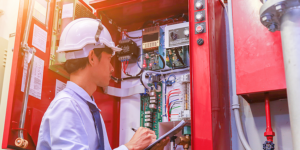Consider a fire that quickly spreads across your home and threatens everything you value. A terrible thought, right? Fire sprinkler systems are an unsung hero that protects you. The innovative devices have saved lives and protected homes for decades.
The Importance of Regular Inspections
Fire sprinkler systems need regular inspections to work properly in a fire. Individual and property safety depends on these inspections.
Regular inspections detect possible flaws and malfunctions before they become major difficulties. Early detection allows you to fix these issues quickly, reducing the chance of system failure when it matters most.
To guarantee your fire sprinklers fulfill all laws and regulations, inspect them regularly. Compliance is required by law and ensures your system works in an emergency.
Potential Risks of Neglecting Inspections
Not inspecting your fire sprinkler system regularly can endanger your safety. Sprinkler failure is a possibility. Components might wear out and reduce fire suppression efficiency over time.
Sprinkler pipe filth, debris, and rust are another problem. In an emergency, this accumulation might obstruct water flow or distribution. Without regular inspections and cleaning, fire sprinklers may fail when you need them most.
Neglecting inspections can result in costly repairs or fire sprinkler system replacement. Long-unnoticed faults may increase, causing greater damage and higher repair expenses.

How Often Should You Inspect Your Fire Sprinklers?
You should inspect fire sprinklers how often? Many homeowners wonder about this. The type of building, occupancy level, and local rules affect inspection frequency. Having your fire sprinklers inspected annually is advised.
Fire sprinkler systems need regular inspections to work properly. They discover potential faults or malfunctions that could impair fire system effectiveness. Regular inspections let you spot concerns early and fix them.
An examination will check numerous fire sprinkler system components. This includes inspecting for pipe leaks or blockages, testing valves, and controls, and ensuring the system has enough water.
Fire sprinkler system inspectors are experts, so employ one to perform these inspections. Following industry norms and guidelines will ensure a thorough exam.
Avoiding inspections can have catastrophic implications. Faulty fire sprinklers can fail in an emergency when seconds matter. This increases fire risk and property damage.
In addition to risks, skipping inspections can lead to local safety violations. Commercial fire protection systems must be maintained and tested in many areas.
What to Look for During an Inspection
To ensure fire sprinkler system functionality, you must know what to check for during an inspection. Some important things to watch:
- Obstructions: Check for sprinkler water flow or coverage obstructions. Things hanging too close, obstructed pipes, or dust collection are examples.
- Look for leaks around sprinkler heads and pipes. Even a tiny leak may indicate a larger issue and should be handled immediately.
- Corrosion: Check all system components for rusty pipes or fittings. System integrity and effectiveness can be compromised by corrosion.
- Damage: Check sprinkler heads, pipelines, and other system components for physical damage. Dents, cracks, and bent parts may need repair or replacement.
- Water pressure: Check your fire sprinkler system’s water pressure to ensure it meets municipal guidelines.
- Coverage area: Ensure each sprinkler head effectively covers its allocated area without gaps.
By regularly inspecting these characteristics, you can spot possible difficulties early and take action before they become severe issues that threaten fire safety.
The Cost and Benefits of Regular Inspections
Regular fire sprinkler system inspections may cost more upfront, but the expense is negligible compared to fire damage and loss. Inspections’ advantages outweigh their costs.
Early system breakdown detection is a big benefit. Early detection saves money on repairs and replacements. Regular inspections guarantee your sprinklers work well in a fire emergency.
Regular inspections may cut insurance premiums and save money on repairs. Well-maintained fire safety equipment, including sprinklers, often earn insurance savings. By using proactive fire protection steps, you may lower your insurance costs.

Conclusion
Your fire sprinkler system needs regular inspections to protect you, your family, and your property. Regularly inspecting and maintaining your fire sprinklers can considerably lessen the chance of a deadly catastrophe.
Inspection neglect can be dangerous. Broken sprinklers may not operate when needed, leaving you vulnerable to fire damage. Outdated safety systems may also result in penalties or legal action.
You should plan regular fire sprinkler system checks to ensure its efficacy. The frequency depends on local laws and industry guidelines. Many residential structures only need annual inspections, but commercial buildings may need more frequent reviews.
On inspection, numerous critical components must be examined. Check for corrosion or leaks in pipes and fittings, valves, alarm devices, water pressure throughout the system, and sprinkler heads for obstructions.
The expenditures of frequent inspections pale in comparison to significant fire losses. Proactive maintenance can save you a lot of money afterward.
